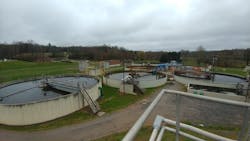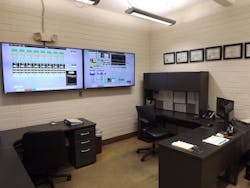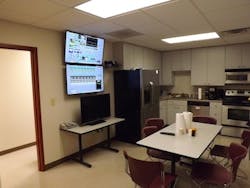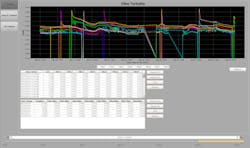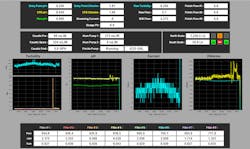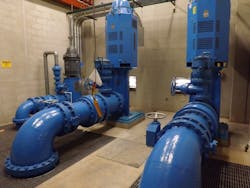SCADA System Aids Rural Utility With Mobility, Alarming & Reporting
About the author:
Jim Meyers is success manager for Inductive Automation. Meyers can be reached at [email protected].
Forward-thinking utilities with a trusted system integrator and the right software can bring an older system into modern times. It also can all be done in a cost-effective manner.
The town of Wilkesboro, N.C., found the right combination of elements to get itself a powerful new supervisory control and data acquisition (SCADA) system for its water filtration plant. The plant now has real-time data, which can be accessed on big screen monitors and cellphones. It has better alarming, faster reporting capabilities and easier access to historical data. It can monitor 10 remote sites.
The ignition platform from Inductive Automation handles these tasks and also eliminates manual processes and paperwork for the town. Things have gone well, and Wilkesboro recently implemented the newest version—Ignition 8—at its wastewater treatment plant. This latest version has improved new mobile capabilities, including full control from mobile devices.
The town found success with these projects by working with long-time collaborator Piedmont Automation of Winston-Salem. The full-service system integration company has been in business 20 years, and has worked with the town of Wilkesboro since the beginning. Piedmont brought the new software to Wilkesboro to replace a system that was not getting the job done.
The software platform features an unusual licensing model. Customers pay by the server, and do not pay additional fees for more tags, clients, users or projects. This allows water districts and organizations in nearly every industry to build and expand the systems they want without being limited by additional costs.
“Ignition’s unlimited licensing structure is making these projects both possible and affordable for Wilkesboro,” said Bob Worth, president of Piedmont Automation. “The software has really transformed daily operations, and it’s given the town a reliable system that’s more commonly seen in larger municipalities.”
The system has won rave reviews from visiting water professionals.
“Just last week, we had a water operational sectional meeting here,” said Sam Call, utility director for the town of Wilkesboro. “We had close to 30 operators from other plants here. They looked at all of our 60-in. monitors and our SCADA system, and they were impressed.”
More Views, More Data
“We give them a centralized view of their entire system,” said Michael Schmid, director of information systems for Piedmont Automation.
The SCADA system monitors the plant pump stations, the remote pump stations, well levels, flow and cleaning systems for filter wells. It also provides trending data for turbidity and chlorine content. The system mostly connects to Automation Direct PLCs.
Wilkesboro has big screen monitors at its main workstation and also has two in the break room. Operators also can see the system on desktop computers and cellphones, so operators can stay informed no matter where they are. And they can receive alarms with notification on their cellphones, as well
“It allows us to run with a leaner crew, because we can be decentralized in our tasks,” Call said. “We don’t have to be at the workstation all the time; we can be doing other things. It really saves us one whole person, from a personnel standpoint.”
Call said the system alarming is more efficient, as it does not require an employee to monitor the process constantly, which opens up opportunities for improvements throughout the plant.
“It’s allowed us to monitor the plant better,” said Alan Parker, plant supervisor of the Wilkesboro Water Filtration Plant. “Before, I’d have to come in to check on the plant as many as 11 times on a weekend. Now I can pull it up on my cellphone, see what the alarm is, and see if it’s critical or not.”
Award-Winning Ways
The filtration plant uses a conventional treatment process with eight dual-media gravity filters. The plant has the capacity to treat 10 million gpd. The original plant was constructed in 1964. Water from the plant serves not only Wilkesboro but also the surrounding community water systems of Broadway, Moravian Falls and West Wilkes. The town’s water system has never been in violation of any U.S. or state EPA standards and has met all water quality parameters. Wilkesboro has won an Area Wide Optimization Award nine straight years. Those awards for water quality are from EPA and the state of North Carolina.
Wilkesboro’s plants were controlled with hardwired discrete controls that required operators to manually monitor and track critical processes. Remote elevated tanks and pump stations were monitored over telephone tone-telemetry lines that were susceptible to interruptions. Real-time process monitoring consisted of local digital indicators, and historical data was recorded on circular paper chart recorders.
The move to more modern control brought Ethernet radios for remote telemetry, and a variety of instrumentation for critical process measurements, communicating via OPC UA. The system also is cross-platform, with a combination of Linux OS and Windows OS on the SCADA servers and clients.
Now, town personnel do not need to make nearly as many visits to remote sites. Historical data is no longer kept on paper, but is in MySQL, where it is easy to generate reports for the state. Automation of reporting is bringing a more efficient system, and will be improved even more in the future.
“It’s faster and less hands-on,” Call said. “Every time you handle data, especially if it’s a person recording something they’re looking at, there’s a chance for an error. What we have now is much more efficient and accurate.”
While the speed of reporting has already increased, it will be even faster once Piedmont implements the next phase of the project. “At that point, we’ll save probably 20 man-hours per month.”
The software platform also helped with the look of the screens operators use everyday.
“We had to make this look pretty similar to their previous system, so everything’s familiar,” Schmid said. “The tools in Ignition make it easy to do that. I love the flexibility. You can make it do anything. It gives you such a blank slate, and that makes it incredibly powerful.”
For the wastewater treatment plant, there is no legacy look that needs to be emulated, so Piedmont plans to provide high-performance graphics there.
Up Next: More Mobile
The wastewater plant also will benefit from the software’s new Perspective module, which has several features that take mobility further. It is mobile-responsive, so it automatically adapts to fit screens of any size. It will be optimized for any device an operator uses, and it provides full control along with other capabilities.
Wilkesboro is looking forward to this next upgrade from Piedmont. The relationship with Piedmont Automation has lasted 20 years because it works, Call said. He added that Piedmont understands what his operators need, and the flexibility of the software platform has allowed Piedmont to provide the town with the customized screens it really wants. Call said many of his operators have contributed ideas to what is displayed and how it is displayed.
Call and Parker are not surprised the system is praised by visitors and they think their system compares well to others.
“We’ve gone to a lot of other water plants, and I haven’t seen anything we’d trade our system for,” Parker said.
“Wilkesboro [has] always tried to do things with efficiency,” Call said. “It’s our mission. And this software really fits into that.”
